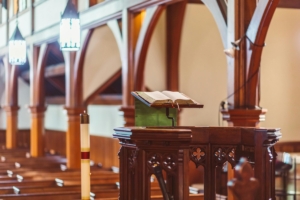The Reformed church today embraces John Calvin as one of our great spiritual predecessors and acknowledges his dedication to purity in the church, and so-called Calvinists champion his ideas on predestination and the sovereignty of God. Continue reading →
Author: Juliette Colunga
Juliette is a graduate of The Master’s University (BS, Biological Sciences) and a member of a church belonging to the URCNA. Despite her not being raised Reformed and a background in the sciences, she has grown a deep appreciation for the historic Reformed confessions and is pursuing a MA in Historical Theology at Westminster Seminary California.
The Reformation, The Regulative Principle, And The Modern Church: Examining John Calvin’s Dedication To Purity In Worship (Part 4)
I tried to imagine what John Calvin’s reaction would be if he walked into your run-of-the-mill worship service today, complete with a full band and contemporary worship songs. The image was ruined by the fact that the only facial expression I can imagine on the great theologian is what I have seen in paintings of him. Continue reading →
The Reformation, The Regulative Principle, And The Modern Church: Examining John Calvin’s Dedication To Purity In Worship (Part 3)
During the summer before my freshman year of high school, I volunteered at my church’s Vacation Bible School program to lead games for the preschoolers. Something I noticed was that the students were more likely to listen to directions to do something than directions not to do something. I remember telling a girl to please refrain from putting her hands into the water bucket. And what do you think she did? She put her hands in the water bucket. Continue reading →
The Reformation, The Regulative Principle, And The Modern Church: Examining John Calvin’s Dedication To Purity In Worship (Part 2)
When I first read Calvin’s Institutes, the clarity with which he described the absolute transcendence and holiness of God struck me, especially as I considered how often my younger, more charismatic self was willing and eager to dismiss concerns about my preferences in worship, even if the concerns came from Scripture itself. Continue reading →
The Reformation, The Regulative Principle, And The Modern Church: Examining Calvin’s Dedication To Purity In Worship (Part 1)
Walk into any corporate worship service today and you will almost certainly observe that the congregational singing is accompanied by instruments. There is no doubt that the common worship style of today, filled with various instruments and too often supplemented by stage lights and smoke machines, differs significantly from the worship one would have observed in a seventeenth-century Reformed church. Continue reading →
